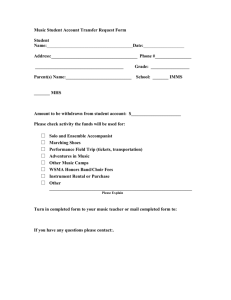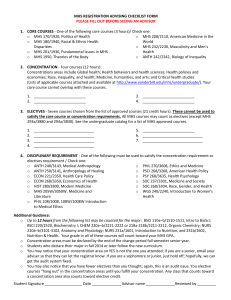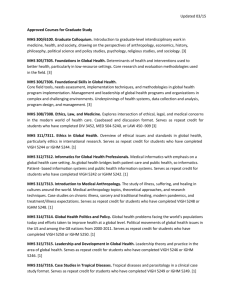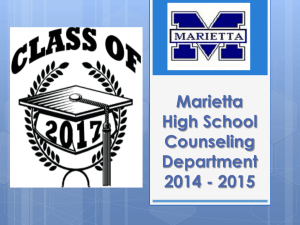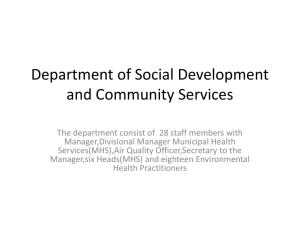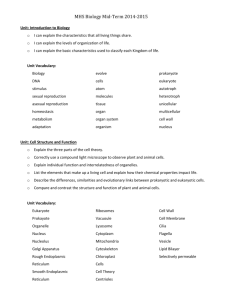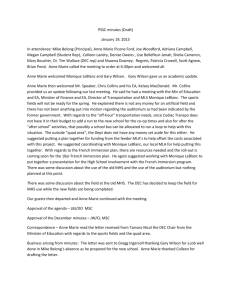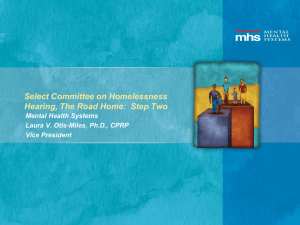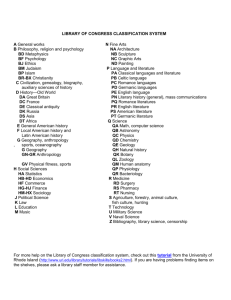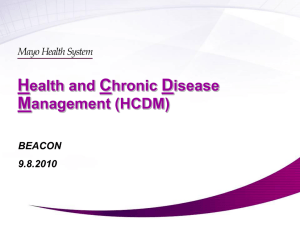MHS Course Plan for Majors
advertisement
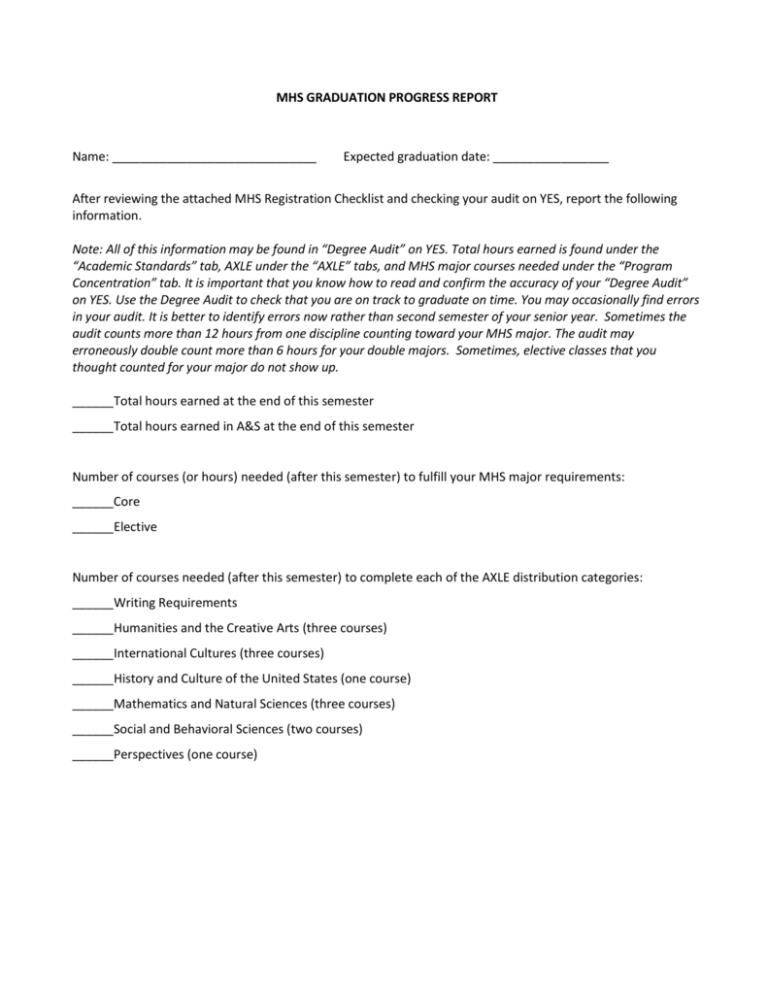
MHS GRADUATION PROGRESS REPORT Name: ______________________________ Expected graduation date: _________________ After reviewing the attached MHS Registration Checklist and checking your audit on YES, report the following information. Note: All of this information may be found in “Degree Audit” on YES. Total hours earned is found under the “Academic Standards” tab, AXLE under the “AXLE” tabs, and MHS major courses needed under the “Program Concentration” tab. It is important that you know how to read and confirm the accuracy of your “Degree Audit” on YES. Use the Degree Audit to check that you are on track to graduate on time. You may occasionally find errors in your audit. It is better to identify errors now rather than second semester of your senior year. Sometimes the audit counts more than 12 hours from one discipline counting toward your MHS major. The audit may erroneously double count more than 6 hours for your double majors. Sometimes, elective classes that you thought counted for your major do not show up. ______Total hours earned at the end of this semester ______Total hours earned in A&S at the end of this semester Number of courses (or hours) needed (after this semester) to fulfill your MHS major requirements: ______Core ______Elective Number of courses needed (after this semester) to complete each of the AXLE distribution categories: ______Writing Requirements ______Humanities and the Creative Arts (three courses) ______International Cultures (three courses) ______History and Culture of the United States (one course) ______Mathematics and Natural Sciences (three courses) ______Social and Behavioral Sciences (two courses) ______Perspectives (one course) MHS REGISTRATION ADVISING CHECKLIST Summary of major requirements 1. Three of the following core courses (9 hours) • Anthropology 240 OR Anthropology 250 • Biological Sciences 105 • Economics 268 • History 280 OR Asian Studies 230 OR MHS 230 • MHS 201 • MHS 202OR MHS 203 • MHS 205W OR Spanish 274 • MHS 248 • Philosophy 108, 108W OR Philosophy 270 • Psychology 268 OR Peabody Psychology 2560 • Sociology 237 OR Sociology 268 2. Nine courses chosen from the approved course list (27 hours). See the undergraduate catalog for a list of approved courses. http://www.vanderbilt.edu/catalogs/undergrad/UGAD.pdf#contents Additional requirements: Students may take, for example, both Anthropology 240 and Anthropology 250, but one course will be counted toward the core and the other(s) will count toward electives. Up to 6 hours from the following list may be counted for the major: BSCI 110a–b, Intro to BioSci; BSCI 220, Biochemistry I; CHEM 220a–b or 218a-218b, Organic Chemistry; NURS 210a–b, Anatomy and Physiology; NURS 231a, Introduction to Nutrition, and 231b, Nutrition & Health. Your grade in all of these courses will count toward your MHS GPA. To ensure breadth, no more than 21 hours may be in courses designated MHS. No more than 12 hours may be in the same discipline. Occasionally, audits treat Peabody and A&S psychology as separate departments; this is an error – they count as the same. No more than 6 hours may double count for MHS and another major; no more than 3 hours for a minor. There are no limits on courses double counting for your major and AXLE. A list of MHSapproved AXLE courses is available at http://www.vanderbilt.edu/mhs/manage/wpcontent/uploads/Distribution-AXLE-MHS-Approved-Courses.pdf Additional resources: To find out which courses are taught for MHS credit, do an “Advanced” course search on YES. Select “Eligible for Medicine Health and Society” under “class attributes.” Information about pass/fail, credit hours or other A&S academic regulations is available on pages 9299 of the Undergraduate Catalog. http://www.vanderbilt.edu/catalogs/undergrad/UGAD.pdf#contents Answers to frequently asked MHS-related questions are available in the FAQ section of the MHS website. http://www.vanderbilt.edu/mhs/undergraduate/ Forms to request a course variance, apply for an independent study or internship are available at http://www.vanderbilt.edu/mhs/forms/ To enroll in an independent study or internship, first ask a faculty member to supervise your project. Next, write a 1-2 page description of your project and have it approved by your advisor. Turn in the independent study or internship form along with the description of your project to the MHS Administrative Assistant in Calhoun 300cc before the first day of class in fall 2013. I recommend that you email me a description of your project before submitting your paperwork. Students getting internship credit will also have to schedule a meeting with Dean Jones. MHS APPROVED COURSES ANTHROPOLOGY: 103, Introduction to Biological Anthropology; 208, Food Politics in America; 240, Medical Anthropology; 242, Biology of Inequality; 244, Biology and culture of race; 250, Anthropology of Healing; 260, Medicine, Culture, and the Body (same as History 283); 265, Psychological Anthropology; 267, Death and the Body; 270, Human Osteology; 273, Human Evolutionary Genetics; 274, Health and Disease in Ancient Populations ASIAN STUDIES: 230, Chinese Medicine BIOLOGICAL SCIENCES: 105, Human Biology; 243, Genetics of Disease; 245, Biology of Cancer; 254, Neurobiology of Behavior BASIC BIOMEDICAL SCIENCES OPTION: Up to SIX HOURS from the following list may be counted for the major. Biological Sciences 110a–110b, Introduction to Biological Sciences; Biological Sciences 220, Biochemistry; Chemistry 220a–220b or 218a–218b,Organic Chemistry; Nursing 210a–210b, Anatomy and Physiology; Nursing 231a, Introduction to Nutrition, and 231b, Nutrition and Health ECONOMICS: 221, Healthcare Policy; 268, Economics of Health ENGLISH: 243, 243W, Literature, Science, and Technology (as appropriate); 291, Special Topics in Creative Writing (as appropriate) Note: Topics vary; the director of the MHS program will approve versions with sufficient MHS content for credit toward the major or minor FRENCH: 205, Medical French in Intercultural Contexts HISTORY: 149, The Modern Human Sciences; 183, Sexuality and Gender in the Western Tradition to 1700; 184, Sexuality and Gender in the Western Tradition since 1700; 216, Medicine in Islam; 280, Modern Medicine; 281, Women, Health, and Sexuality; 283, Medicine, Culture, and the Body (same as Anthropology 260); 284a, Epidemics in History; 284b, Health and the African American Experience; 284c, Psychological Century HUMAN AND ORGANIZATIONAL DEVELOPMENT (PEABODY): 2510, Health Service Delivery to Diverse Populations; 2525, Introduction to Health Services; 2530, Introduction to Health Promotion; 2535, Introduction to Health Policy; 2550, Managing Health Care Organizations; HOD- 2670, Introduction to Community Psychology (same as PSY-PC-2470); 2690, Health Promotion Delivery NEUROSCIENCE: 201, Neuroscience; 235, Biological Basis of Mental Disorders PHILOSOPHY: 108, 108W, Introduction to Medical Ethics; 239, 239W, Moral Problems; 256, Philosophy of Mind; 270, Ethics and Medicine POLITICAL SCIENCE: 268, American Health Policy PSYCHOLOGY: 101, General Psychology; 211, Personality; 214, Perception; 215, Abnormal Psychology; 232, Mind and Brain; 244, Introduction to Clinical Psychology OR PSY-PC-2700, Introduction to Clinical Psychology; 245, Emotion; 246, Schizophrenia; 247, Depression; 252, Human Sexuality; 268, Health Psychology OR PSY-PC2560, Health Psychology; 277, Brain Damage and Cognition; PSY-PC-1200, PSY-PC-1207, Minds, Brains, Cultures, and Contexts; PSY-PC-1500, Cognitive Aspects of Human Development; PSY-PC-1630, Developmental Psychology; PSYPC- 1700, PSY-PC-1707, Social and Emotional Context of Cognition; PSYPC- 1750, Social and Personality Development; PSY-PC-2100, Advanced Topical Seminar (approval dependent upon topic); PSY-PC2250, Infancy; PSY-PC-2320, Adolescent Development; PSY-PC-2470, Introduction to Community Psychology (same as HOD-2670) RELIGIOUS STUDIES: 202, Natural Science and the Religious Life; 234, Post-Freudian Theories and Religion SOCIOLOGY: 101, Introduction to Sociology; 101W, Introduction to Sociology; 102, Contemporary Social Problems; 102W, Contemporary Social Problems; 201, Sociological Perspectives; 205, Poverty, Health, and Politics; 220, Population and Society; 221, Environmental Inequality and Justice; 237, Society and Medicine; 257, Gender, Sexuality, and the Body; 264, Social Dynamics of Mental Health; 268, Race, Gender, and Health; 294, Seminars in Selected Topics (as appropriate) Note: Topics vary; the director of the MHS program will approve versions with sufficient MHS content for credit toward the major or minor. *Credit not given for both SOC 101 and SOC 102 SPANISH: 211, Spanish for the Medical Profession; 274, Literature and Medicine WOMEN’S AND GENDER STUDIES: 212, Lesbian, Gay, Bisexual, and Transgender Studies; 240, Introduction to Women’s Health; 267, Seminar on Gender and Violence; 268, Gender, Race, Justice, and the Environment

